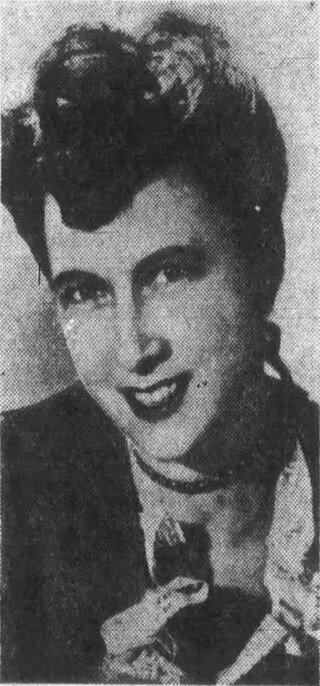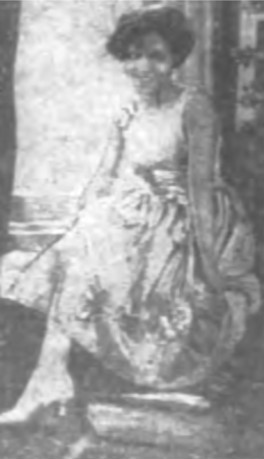
Mary Louise Cecilia "Texas" Guinan was an American actress, producer, and entrepreneur. Born in Texas to Irish immigrant parents, Guinan decided at an early age to become an entertainer. After becoming a star on the New York stage, the repercussions of her involvement in a weight loss scam motivated her to switch careers to the film business. Spending several years in California appearing in numerous productions, she eventually formed her own company.

Mayo Jane Methot was an American film and stage actress. She appeared in over 30 films, as well as in various Broadway productions, and attracted significant media attention for her tempestuous marriage to actor Humphrey Bogart.

Edith Taliaferro was an American stage and film actress of the late 19th and early 20th centuries. She was active on the stage until 1935 and had roles in three silent films. She is best known for portraying the role of Rebecca in the 1910 stage production of Rebecca of Sunnybrook Farm.

Robert Wesley Addy was an American actor of stage, television, and film.

Helen Menken was an American stage actress.

Hell's Bells AKA Fool's Gold, is a 1924 play in three acts written by Barry Conners. It is a farce with a large cast and one setting. The story concerns two middle-aged Arizona-based prospecters, sent back East by a speculator to sell shares in his mine. To expedite sales, they pose as millionaires, which leads the Connecticut sisters of one prospector to have him committed so they can obtain control of his supposed wealth.
The Noose is a 1926 play in three acts written by Willard Mack. It is a melodrama, with a large cast, fast pacing, and two settings. The story tells of a young man condemned for the murder of a fellow bootlegger, and his refusal to explain why he did it.

The Old Maid is a 1934 play by American playwright Zoë Akins, adapted from Edith Wharton's 1924 novella of the same name. The play as published has six "episodes", covering twenty-one years of time. It has a large cast, and three settings; one is used for the last four episodes (scenes). The story concerns two women, cousins, who allow rancor over a lost love to become a struggle for the illegitimate daughter of one.
Murray Kinnell was a British-born American actor, recognized for playing smooth, gentlemanly, although rather shady characters. He began acting on the English stage in 1907, toured in the United States from 1912 through 1914, then returned to England where he served in the British Army during World War I. After the war, he emigrated to the US. He appeared in 71 films between the pre-code era of 1930 and 1937. He later served the Screen Actors Guild in several positions for 16 years.

Grace Voss Frederick was an American actress on the Broadway stage and on television when it was still an experimental medium. During the Great Depression, Voss shifted to photography to earn a living. She became a well-known portrait photographer and her work was featured in magazines like Life and Look. She transitioned from portraiture to television background and set designs in 1953 together with her husband Claude Frederick. Their work was shown on popular television shows of the period and featured in several movies. Because of the limits of technology, she invented a machine, known as the "Threeplex", which allowed still background photographs to simulate moving or time effects. The machine was donated to Brigham Young University after the couple's retirement.

Mary Hanford Ford was an American lecturer, author, art and literature critic and a leader in the women's suffrage movement. She reached early notoriety in Kansas at the age of 28 and soon left for the Chicago World's Fair. She was taken up by the society ladies of the Chicago area who, impressed with her talks on art and literature at the Fair, helped launch her on a new career, initially in Chicago and then across some States. Along the way she was already published in articles and noticed in suffrage meetings.

Hilda Perleno was an American blues and jazz singer, known for her Broadway appearances in the 1920s and 1930s.

Beatrice Irwin was an actress, poet, designer and promoter of the Baháʼí Faith. Born Alice Beatrice Simpson, she took Beatrice Irwin as her stage name and later adopted it as her real name.

Norma Stafford Mitchell was an American actress and writer.
Vivienne Baber was an actress in the United States. She had a starring role in the 1932 film The Black King.

Atalie Unkalunt was a Cherokee singer, interior designer, activist, and writer. Her English name Iva J. Rider appears on the final rolls of the Cherokee Nation. Born in Indian Territory, she attended government-run Indian schools and then graduated from high school in Muskogee, Oklahoma. She furthered her education at the New England Conservatory of Music in Boston, Massachusetts. After a thirteen-month engagement with the YMCA as a stenographer and entertainer for World War I troops in France, she returned to the United States in 1919 and continued her music studies. By 1921, she was living in New York City and performing a mixture of operatic arias, contemporary songs, and Native music. Her attempts to become an opera performer were not successful. She was more accepted as a so-called "Indian princess", primarily singing the works of white composers involved in the Indianist movement.

Elizabeth Berkley Grimball was an American theatrical and film producer, writer, director, entrepreneur, and educator. She founded and directed Inter-Theater Arts in New York, and produced more than two dozen historical pageants.

José Ruben was a French-born actor whose career from 1910 on was in the United States. He first rose to prominence in 1916-1917 with the Washington Square Players, and for the next ten years was a highly regarded lead player. He acted in over twenty silent films and was a fixture on Broadway stages, as both performer and director, for over forty years. He also taught drama at Barnard College and was a stage director for the New York City Opera.

The Family Upstairs is a play in three acts by Harry Delf. It has a medium-sized cast, one setting, and quick pacing. It is a domestic comedy, centered around the five-member apartment-dwelling Heller family, their endless bickering, and the elder daughter's suitor.

Vivian L. Cosby, also spelled as Vivian Crosby, was an American playwright and novelist who produced scripts for theater and films from the 1920s through the 1940s. A Bostonian, Cosby began appearing in theater and writing plays and musical pieces from a young age. Her works started being adapted for the stage in the 1920s while she joined RKO Radio as a script writer.

















